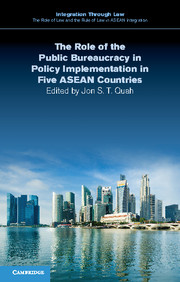Book contents
- Frontmatter
- Contents
- List of tables
- List of contributors
- General editors’ preface
- Preface
- 1 The role of the public bureaucracy in policy implementation in five ASEAN countries: a comparative overview
- 2 Weak central authority and fragmented bureaucracy: a study of policy implementation in Indonesia
- 3 The public bureaucracy's role in policy implementation in Malaysia
- 4 Dysfunctional bureaucracy, corruption and weak rule of law: a case study of policy implementation in the Philippines
- 5 Governance and meritocracy: a study of policy implementation in Singapore
- 6 Vietnam's public bureaucracy and implementation of two ASEAN policies
- 7 Policy implementation in ASEAN and the European Union: the problem of asymmetric compliance
- Executive summary
- Index
- References
3 - The public bureaucracy's role in policy implementation in Malaysia
Published online by Cambridge University Press: 05 February 2016
- Frontmatter
- Contents
- List of tables
- List of contributors
- General editors’ preface
- Preface
- 1 The role of the public bureaucracy in policy implementation in five ASEAN countries: a comparative overview
- 2 Weak central authority and fragmented bureaucracy: a study of policy implementation in Indonesia
- 3 The public bureaucracy's role in policy implementation in Malaysia
- 4 Dysfunctional bureaucracy, corruption and weak rule of law: a case study of policy implementation in the Philippines
- 5 Governance and meritocracy: a study of policy implementation in Singapore
- 6 Vietnam's public bureaucracy and implementation of two ASEAN policies
- 7 Policy implementation in ASEAN and the European Union: the problem of asymmetric compliance
- Executive summary
- Index
- References
Summary
Introduction
The Malaysian public service plays a significant role in the country's economic and social development. More importantly, it has been instrumental in initiating the country's transformational efforts towards a high income nation. This chapter analyses the role of the public service in policy implementation in Malaysia, and assesses its effectiveness in implementing these two Association of Southeast Asian Nations (ASEAN) agreements: (1) the Agreement on the ASEAN Harmonized Cosmetic Regulatory Scheme, or the ASEAN Cosmetic Directive (ACD), which Malaysia signed together with the other ASEAN countries at the 35th ASEAN Economic Ministers Meeting in Cambodia in September 2003; and (2) combating transnational crime, as agreed under the ASEAN Ministerial Meeting on Transnational Crime (AMMTC) and the Senior Officials Meeting on Transnational Crime (SOMTC).
This chapter begins by describing Malaysia's policy context, followed by an analysis of the public bureaucracy's profile and its role in policy formulation. The implementation of the ACD and AMMTC/SOMTC is then analysed in depth before concluding the chapter with a summary of the major findings.
Malaysia's policy context
This section describes Malaysia's policy context in terms of its geography, formative historical experiences, economy, demography and political system as these factors affect the public bureaucracy's effectiveness in policy implementation.
Geography
Malaysia has a total land area of 332, 665 sq. km (The Economist 2013: 178) and consists of thirteen states, with eleven states located in Peninsular Malaysia, and the East Malaysian states of Sabah and Sarawak. These two states have a higher degree of local government and legislative autonomy than the West Malaysian states. Sabah and Sarawak have separate laws regulating the entry of citizens from other states in Malaysia, whereas, in Peninsular Malaysia, there are no restrictions on inter-state travel or migration, including visitors from East Malaysia. There are also separate land laws governing Sabah and Sarawak, as opposed to the National Land Code, which governs Peninsular Malaysia. The three main land laws are: (1) National Land Code (Act 56 of 1965) implemented in all states in Peninsular Malaysia; (2) Sarawak Land Code (Cap 81) implemented for Sarawak only; and (3) Sabah Land Ordinance (Cap 68) implemented for Sabah only.
Formative historical experiences
The Federation of Malaya was granted independence from Great Britain on 31 August 1957 with a relatively peaceful period of transition that was largely achieved by the granting of concessions to the main ethnic groups in Malaya, …
- Type
- Chapter
- Information
- Publisher: Cambridge University PressPrint publication year: 2016

